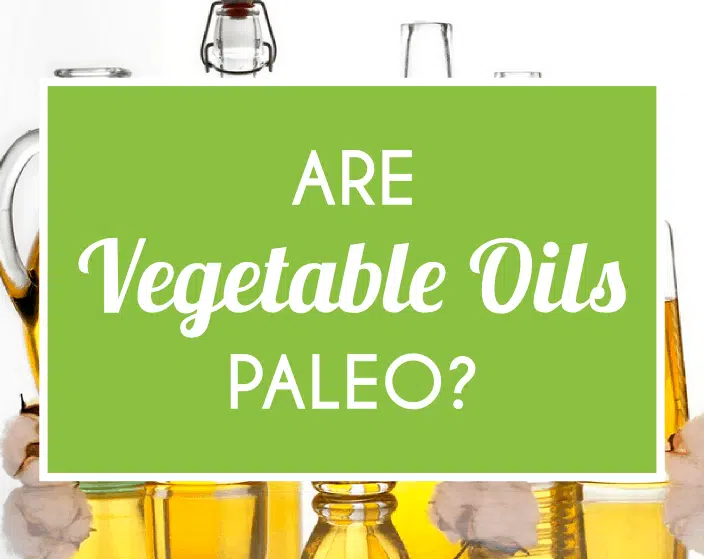The Quick Answer
No. Vegetable oils aren’t paleo (although it does depend on which exact oil you’re talking about). The majority of vegetable oils are not considered paleo, while a select few are.

Table of Contents
Why Aren’t Vegetable Oils Paleo?
When we think of vegetable oils, we are usually referring to one of the types below:
- Canola (rapeseed) oil
- Corn oil
- Soybean oil
- Rice bran oil
- Sunflower oil
- Safflower oil
- Peanut oil
- Cottonseed oil
These vegetable oils are not paleo for a few reasons. They don’t have an ideal ratio of fatty acids. In other words, they don’t have enough omega-3s to compete with their abundance of omegas-6s. They are also very highly processed and some types contain molecules that are destructive once cooked.
Fatty Acid Composition
Most people get plenty of omega-6 fatty acids in their diets already because they are present in most foods that are widely available and commonly eaten like grains, processed carbs, low quality animal products, and fried foods. However, omega-3 fatty acids are a bit harder to come by, especially if your diet is not so great. Omega-3s are important for many reasons and functions: cholesterol health, brain function, reducing inflammation, energy maintenance, and much more.
Omega-6s are not inherently bad, but it’s a problem when they dominate and someone does not consume enough of both kinds of fatty acids to keep things balanced. Omega-6s are thought to act as “sticky” molecules in the blood, which is helpful when they are helping our blood to form necessary clots, but not so great when they start clogging our arteries. So an overabundance of them can lead to heart trouble and inflammation.
Highly Processed
Another problem with vegetable oils is that they are extremely well processed. A good rule of thumb when choosing an oil is to consider the actual food that the oil comes from and to ask yourself if it seems like something that could easily be turned into an oil. While things like walnuts, coconuts, and olives obviously contain fat, the same thing cannot be said for sunflowers and rice bran, can it?
To extract oil from a vegetable or a grain that does not have a lot of fat it in to begin with, you have to use a very complicated process, as well as chemical solvents that are heated to high temperatures, and genetically modified ingredients. Processing takes a long time and is carried out in conditions that could lead the oils to oxidize. Oxidization occurs when an oil is heated to the point that it becomes rancid or toxic, meaning that many of the oil’s benefits (if it even had any) are lost.
Oxidation also means that the oil gains the ability to damage your cholesterol levels and mess with your heart health. This is all done before the vegetable oil even hits the shelves in your supermarket. After you actually buy these oils and cook with them, the risk of oxidation only increases. So for this reason, cooking with vegetable oils is not a good idea.
Exceptions
Avocado oil, coconut oil, and olive oil are the exceptions to the “no vegetable oil rule.” These oils are all perfectly healthy and they are paleo. This is because they have a more ideal ratio of fatty acids and they are far less processed than the other types of vegetable oils. They can often be found in “expeller pressed” form, meaning the oil was literally squeezed very powerfully out of the vegetable, but no complex chemical process took place. Coconut oil also has the ability to stand up to high heats and avoid oxidation.
Is There Any Confusion When It Comes To Vegetable Oils Being Paleo?
No, not really. Most people today agree that vegetable oils are not paleo and that they are very processed GMO- and toxin-containing foods.
So Are Vegetable Oils Paleo?
No. Vegetable oils are not paleo. To sum things up, there are better oil options out there for cooking with and for getting healthy fats into your diet with (like oils from avocados, fish, and most nuts). If you’re looking for a paleo-approved oil to cook with or to add to your salads, try one of these: flaxseed, walnut, olive, macadamia, coconut, or avocado oil. Different oils are best used at different times. For example, coconut oil is great for roasting, and extra virgin olive oil is great for drizzling onto your food, so do your research.
How To Know What Is And Isn’t Paleo
Check out Paleo.io, the mobile app that answers the question, “is __ paleo?” Paleo.io comes with the most comprehensive paleo diet food list out there, so no matter which food you’re confused about, you’ll always be able to find out whether or not it’s paleo.
Photo credit: Cottonseed Oil